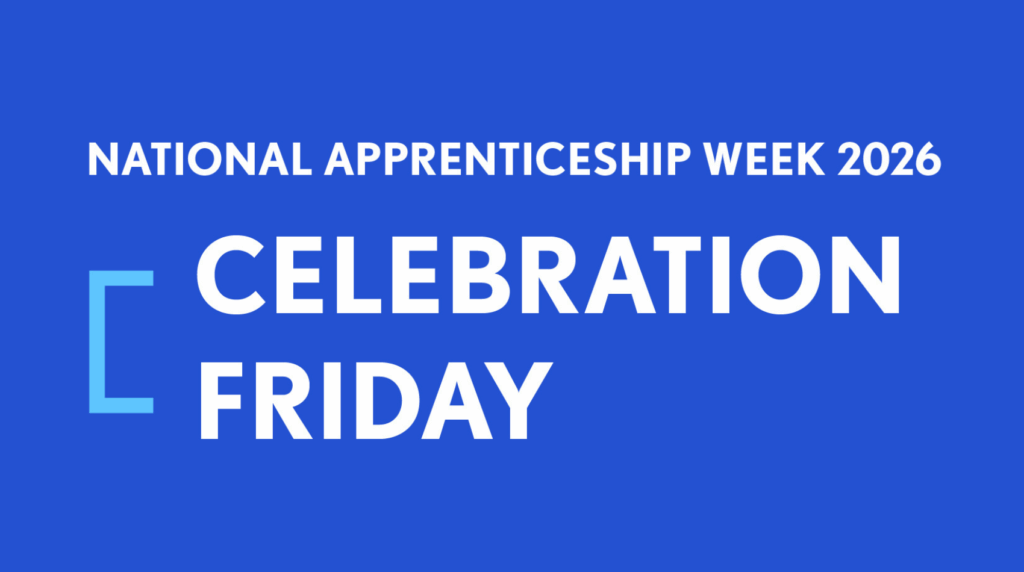Abi Hickey,
Content Creator
29th August 2024
Are apprenticeships the future of work?
We all know how quickly the job market is evolving and this is having a major knock-on effect on how we now prepare for our careers. Traditional university degrees were once considered standard for career readiness but this is now being re-examined by both employers and employees. A recent Amazon study on Europe found that more than half the workers (54%) believe that on-the-job skills training and apprenticeships are more valuable than traditional university education for preparing the workforce. This shift highlights the growing recognition that apprenticeships aren’t just an alternative to higher education – they’re becoming essential to the future of work.
The power of hands-on experience
One of the key reasons apprenticeships are gaining popularity is due to their emphasis on hands-on experience. Unlike the theory-focused university programmes, apprenticeships offer real-world training that directly translates into job-ready skills. Leaving apprentices with the ability to hit the ground running in the workforce.
But it’s not just technical skills that apprenticeships foster. They also help develop essential soft skills such as problem-solving, communication, and teamwork skills that are critical in almost every profession and are often best learned through real-world experience.
Modern apprenticeships for a changing workforce.
The relevance of apprenticeships has expanded beyond traditional trades, with apprenticeship programmes across 18 different industry sectors. The expansion reflects the shifting demands of the workforce and the increasing complexity of career paths. As these industries evolve so must the training and education alongside them.
According to a European study by Amazon, 73% of workers believe there should be more apprenticeship opportunities, especially for young people. Currently in the UK under the Labour government, they are funding apprenticeships for non-levy paying employers who take on an apprentice aged 16-21.
Lifelong learning and flexibility
The growing demand for apprenticeships also aligns with the growing need for lifelong learning. In today’s job marketing, the idea of a single, unchanging career is becoming a thing of the past. Workers are now expected to adapt continuously to new technologies and industry shifts. This demands a commitment to ongoing education and apprenticeships are the best path for this.
A significant 89% of European employees believe that learning new skills is essential for advancing or changing their career paths. Apprenticeships offer opportunities to gain new skills, allowing the learner to pivot into different roles without the financial and time investment that traditional education requires. Apprenticeships also provide career flexibility, by offering training that is directly aligned to industry needs, apprenticeships help workers remain competitive and relevant in their current field – or transition to entirely new ones- ensuring long-term career sustainability.
Bridging the skills gap
One of the most pressing challenges facing the workforce is the skills gap. Apprenticeships are uniquely equipped to bridge this gap. By working closely with industry partners, apprenticeship programmes can tailor their training to meet specific employer needs. This alignment not only benefits employers but also provides apprentices with a clear pathway to meaningful employment. With 67% of workers believing that continuous retraining will be necessary to stay relevant in the future, apprenticeships offer a practical solution to the ongoing demand for skilled workers.
Addressing your Net Zero Aspirations
Climate change is having an impact on businesses & organisations across the UK pushing them to rethink their environmental impact and sustainability practices. As companies set their Net Zero goals, there is a growing need for skilled professionals who can drive these initiatives forward.
From 2023 six apprenticeships recognised with the Coronation emblem representing the pinnacle of green skills training.These programmes have been selected for their excellence in preparing individuals for roles that contribute to a low-carbon economy:
-
- Countryside Worker (level 2)
- Forest Craftsperson (level 3)
- Low Carbon Heating Technician (level 3)
- Installation Electrician and Maintenance Electrician (level 3)
- Sustainability Business Specialist (level 7)
- Corporate Responsibility and Sustainability Practitioner (level 4)
Our Corporate Responsibility and Sustainability Practitioner apprenticeship offers a unique opportunity for individuals to develop expertise in a field that is crucial for today’s business environment. By participating in this programme apprentices will not only gain practical experience that contributes to meaningful social and environmental change. This apprenticeship aligns with the growing demand for green skills and CSR expertise, making it a valuable investment for both personal career growth and organisational impact.
For individuals, apprenticeships provide a clear pathway to a meaningful, well-paying career. For employers, they offer a solution to the skills gap and a way to cultivate a highly skilled workforce. As more people and industries embrace this model, apprenticeships will continue to shape the future of work ensuring that both workers and employers are prepared for the ever-changing world.
————–
For further insights and guidance on maximising your apprenticeship funding, please don’t hesitate to reach out to us at:
Tel: 023 8017 0380
Email: hello@kiwieducation.co.uk
Kiwi & Yuzu Ltd is committed to empowering businesses and individuals through quality education, training, and skills development.
Employers
Read More
Individuals
Available Courses
International
Our Partnerships


